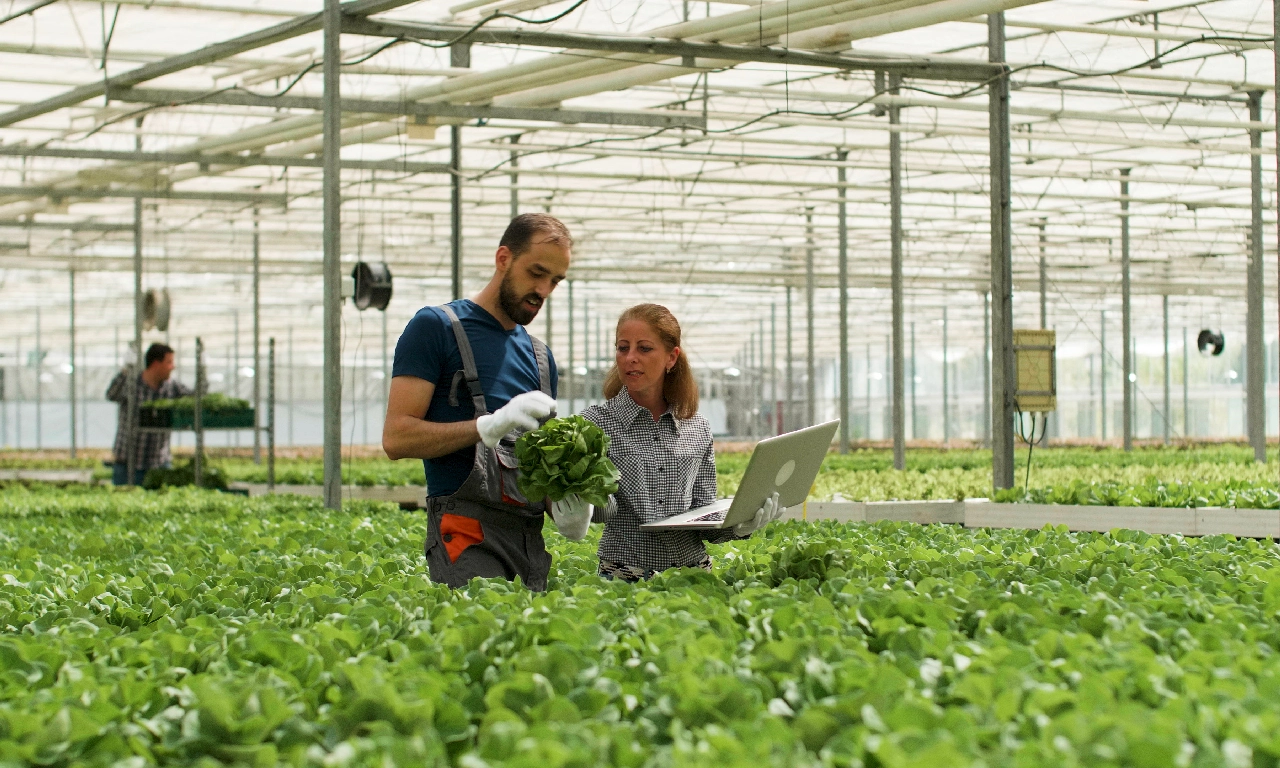List of Top 10 Agri Startups in India: Funding, Focus & Impact

India’s agriculture sector is vast but under-optimized. The country is the world’s largest producer of milk, jute and pulses, and among the top producers of rice, wheat, sugarcane and fruits. Yet farming contributes only about 18% of GDP,[1] even as ~46% of the population works on farms.[2]
This gap has spurred an agriculture startups in India revolution: engineers and entrepreneurs are using AI, IoT and data analytics to help farmers grow more with less. Investment is pouring in – agritech deals jumped ~28% in 2024 vs 2023, and agri startups in India have raised over $2.4 billion since 2014.
In the sections below, we explore how sustainable agriculture startups in India – from precision-farming platforms to digital marketplaces – are transforming farming, supported by new agriculture startup ideas in India, government schemes, and venture-building expertise like GrowthJockey’s AI-driven model.
Why Agriculture Startups in India Matter
Modern agritech is reshaping traditional farming. With climate risks rising (India is classified as “water-stressed” and 90% of water goes to irrigation[3]), agri startups are deploying technology to conserve resources and boost yield. Precision sensors and AI let a startup like Fasal tell a farmer exactly when to irrigate, which has saved roughly 3 billion litres of water on 10,000 acres of crops.
Meanwhile, digital platforms connect farmers to markets: apps like AgroStar and BigHaat provide local-language advice and high-quality inputs via mobile, already reaching millions of smallholders. As one survey notes, agri-innovations are driving India’s fourth (tech) revolution in farming. The overall agritech market is projected to exceed $24 billion by 2025, reflecting huge opportunity for efficiency and sustainability.
Here are some key trends and opportunities in India’s agri-tech ecosystem:
-
Precision Agriculture: IoT solutions, drones and AI optimize water, fertilizer and pesticide use. Tools can map soil moisture or detect crop disease early (e.g., Fasal’s smart irrigation). This area is a major focus for agriculture startup in India.
-
Mobile Marketplaces: Online platforms (B2C and B2B) link farmers directly to input suppliers or buyers. For example, apps let farmers order seeds or sell vegetables without middlemen.
-
Supply Chain & Logistics: Solutions like cold storage, farm-to-retail networks and apps (e.g., Ninjacart, Ergos) reduce post-harvest losses and waste by up to 20–30%. These solutions align with agriculture startup schemes and funding opportunities.
-
Farm Management Software: Data-driven SaaS tools (like CropIn) provide real-time farm monitoring, weather forecasts, and yield analytics to improve decision-making.
-
Sustainable Inputs & Bio-solutions: Startups are developing natural fertilizers, biopesticides, and organic food products to cut chemical use and promote eco-friendly farming.
-
Agri-Fintech & Advisory: Digital lending, insurance, and AI-based crop advisories are helping farmers access credit and expert guidance tailored to their fields and risks, forming part of agriculture startup funding in India.
For example, Fasal’s IoT sensors alerted farmers to over‑irrigation and helped optimize watering – saving an estimated 3 billion litres of irrigation water across its deployments. Similarly, platforms like AgroStar and BigHaat have brought millions of small farmers online: AgroStar’s voice-enabled app serves over 5 million farmers with inputs and advice, while BigHaat claims >4 million user sign-ups.
These innovations demonstrate how agri startups in India combine productivity gains with sustainability. By tapping data and smart tech, startups can help India’s farmers grow more food with fewer resources – a win for incomes, the environment, and the growth of farming startups in India.
Several homegrown startups are at the forefront of this change. Notable examples include:
Top Agriculture Startups in India
| Startup | Founded | Founders | Location | Focus | Funding Overview |
|---|---|---|---|---|---|
| AgroStar | 2013 | Shardul Sheth, Sitanshu Sheth | Pune, Maharashtra | Agri-input marketplace and advisory | Backed by multiple investors; raised over USD 100M |
| DeHaat | 2012 | Shashank Kumar, Amrendra Hazra | Patna / Gurugram | Full-stack agriculture services | One of India's highest-funded agritech firms; over USD 250M raised |
| Ninjacart | 2015 | Thirukumaran Nagarajan, others | Bengaluru, Karnataka | Fresh produce supply chain | Major funding from Flipkart & Tiger Global; over USD 250M raised |
| Stellapps | 2011 | Ranjith Mukundan, others | Bengaluru, Karnataka | Dairy digitization & IoT | Raised over USD 45M from dairy & tech investors |
| WayCool Foods | 2016 | Karthik Jayaraman, Sanjay Dasari | Chennai, Tamil Nadu | Farm-to-fork supply chain | Over USD 300M secured across equity & debt |
| BharatAgri | 2017 | Siddharth Dialani, Sai Gole | Bengaluru, Karnataka | Precision agronomy platform | Venture-backed; funding over USD 10M |
| CropIn | 2010 | Krishna Kumar | Bengaluru, Karnataka | Farm data intelligence | Global VC backed; raised over USD 30M |
| Bijak | 2019 | Dheeraj Jain, others | Delhi NCR | B2B agri-commodity marketplace | Over USD 35M raised from leading investors |
| Fasal | 2018 | Shailendra Todi, Sudhanshu Rai | Bengaluru, Karnataka | IoT-led precision farming | Growth-stage funding; raised over USD 15M |
| Reshamandi | 2020 | Mayank Tiwari | Bengaluru, Karnataka | Silk supply chain technology | Backed by marquee investors; over USD 45M raised |
1. AgroStar
Founded: 2013
Founders: Shardul Sheth, Sitanshu Sheth
Location: Pune, Maharashtra
Funding: Backed by leading VCs with over USD 100M raised
Overview:
AgroStar provides farmers with access to verified inputs and expert agronomy support through a digital platform. It helps reduce guesswork in fertilizer, seed, and pesticide choices by offering crop-specific recommendations.
Key Offerings:
-
Digital agri-input marketplace
-
AI-enabled crop advisory
-
Helpline & remote agronomy support
Impact:
Helps farmers improve yields and avoid input misuse through scientific guidance.
Focus: Input commerce + agronomy intelligence
Outcome: Better productivity & lower risk through informed support
2. DeHaat
Founded: 2012
Founders: Shashank Kumar, Amrendra Hazra
Location: Patna / Gurugram
Funding: One of India's most capitalized agritech startups; over USD 250M raised
Overview:
DeHaat provides end-to-end agricultural support including input supply, expert advisory, credit, and market linkage. It operates through rural centers and tech platforms to enable direct access to services.
Key Offerings:
-
Input supply & agronomy support
-
Credit and insurance access
-
Post-harvest market linkage
Impact:
Improves farmer income through better input pricing and direct market reach.
Focus: Full-stack agriculture enablement
Outcome: Higher profitability and reduced middlemen dependency
3. Ninjacart
Founded: 2015
Founders: Thirukumaran Nagarajan, others
Location: Bengaluru, Karnataka
Funding: Large-scale institutional funding exceeding USD 250M
Overview:
Ninjacart digitizes the fresh-produce supply chain by linking farmers to retailers and restaurants. Tech-enabled logistics and demand forecasting minimize wastage and improve price certainty.
Key Offerings:
-
Fresh produce aggregation network
-
Logistics & warehousing infrastructure
-
Price transparency & fast payouts
Impact:
Reduces food waste and ensures predictable earnings for farmers.
Focus: Fresh produce supply chain tech
Outcome: Efficient distribution & fair pricing
4. Stellapps
Founded: 2011
Founders: Ranjith Mukundan, others
Location: Bengaluru, Karnataka
Funding: Over USD 45M raised from strategic and tech investors
Overview:
Stellapps upgrades dairy operations through IoT-based animal health monitoring, milk quality tracking, and supply digitization tools. It supports farmers with herd insights and quality certification.
Key Offerings:
-
Dairy IoT & monitoring
-
Milk traceability & testing
-
Herd health management
Impact:
Boosts milk quality and improves dairy productivity.
Focus: Dairy supply chain digitization
Outcome: Higher yields & better quality compliance
5. WayCool Foods
Founded: 2016
Founders: Karthik Jayaraman, Sanjay Dasari
Location: Chennai
Funding: Over USD 300M across equity and debt
Overview:
WayCool connects farmers to retail and institutional buyers through tech-driven procurement, cold-chain logistics, and quality-grading systems to minimize wastage.
Key Offerings:
-
Farm-to-retail distribution
-
Cold-chain systems
-
Commodity quality grading
Impact:
Reduces post-harvest losses & improves farmer revenue.
Focus: Agri-supply chain modernization
Outcome: Transparent, efficient, low-waste supply chain
6. BharatAgri
Founded: 2017
Founders: Siddharth Dialani, Sai Gole
Location: Bengaluru
Funding: Growth-backed; over USD 10M raised
Overview:
BharatAgri provides hyper-local agronomy guidance based on soil data, crop cycles, and weather conditions. It supports farmers with structured irrigation, nutrition, and pest plans.
Key Offerings:
-
Climate-aware crop calendars
-
Irrigation & fertilizer guidance
-
Disease alerts
Impact:
Optimizes farm inputs & minimizes crop risk.
Focus: Precision agronomy
Outcome: Higher yields & improved cost efficiency
7. CropIn
Founded: 2010
Founder: Krishna Kumar
Location: Bengaluru
Funding: Backed by global funds; over USD 30M raised
Overview:
CropIn enables agribusinesses to monitor farming operations, digitize fields, and track crop outcomes. Its platform supports traceability and supply chain transparency.
Key Offerings:
-
Farm digitization
-
Remote crop monitoring
-
Traceability & compliance tools
Impact:
Strengthens sourcing transparency & quality assurance.
Focus: Smart farm management software
Outcome: Standardized quality & scalable traceability
8. Bijak
Founded: 2019
Founders: Dheeraj Jain, others
Location: Delhi NCR
Funding: Over USD 35M raised from top investors
Overview:
Bijak builds trust-driven B2B agri commerce by connecting traders and buyers with verified networks, financial tools, and credit support.
Key Offerings:
-
Agri-commodity trade platform
-
Digital payments & ledger
-
Rating-based trust system
Impact:
Improves price accuracy and speeds up trade cycles.
Focus: Agri-commodity marketplace
Outcome: Transparent, reliable trade ecosystem
9. Fasal
Founded: 2018
Founders: Shailendra Todi, Sudhanshu Rai
Location: Bengaluru
Funding: Raised over USD 15M across growth rounds
Overview:
Fasal uses climate sensors and AI to provide irrigation and disease alerts for fruit and horticulture farmers, helping optimize resources and protect crops.
Key Offerings:
-
Farm IoT sensors
-
Disease prediction & irrigation alerts
-
Weather intelligence
Impact:
Saves water (Fasal has saved over 50 billion liters[4]) & improves harvest quality.
Focus: Precision horticulture
Outcome: Reduced input costs & enhanced crop consistency
10. Reshamandi
Founded: 2020
Founder: Mayank Tiwari
Location: Bengaluru
Funding: Over USD 45M raised from domestic and global funds
Overview:
Reshamandi digitizes India's silk supply chain by enabling farmers, reelers, and weavers with inputs, advisory, quality checks, and market linkage tools.
Key Offerings:
-
Sericulture advisory
-
Digital supply chain platform
-
Working capital support
Impact:
Enhances silk quality & market reach for rural communities.
Focus: Silk value-chain modernization
Outcome: Higher efficiency & better livelihood outcomes
Agriculture Startup Ideas and Emerging Innovations in India
The agriculture sector in India is evolving rapidly, with technology-driven solutions opening multiple avenues for innovation. Entrepreneurs can target unmet needs across the value chain; from farm inputs and advisory to logistics, post-harvest management, and consumer delivery. Successful startups combine digital tools with real-world solutions to increase productivity, reduce waste, and improve farmer incomes.
Some of the most promising and emerging areas for agritech ventures include:
-
Controlled-Environment and Vertical Farming: Indoor farming, hydroponics, and climate-controlled greenhouses allow year-round cultivation while using up to 80% less water. Startups like Eeki Foods are leading in this space.
-
Circular AgriTech: Converting farm waste into value-added products such as compost, bioenergy, or materials. For example, ventures like Farmtheory collect crop residues to create nutrient-rich compost, improving soil health and reducing environmental impact.
-
AI and Data-Driven Farm Analytics: Advanced AI platforms analyze satellite or drone imagery to identify pest infestations, nutrient deficiencies, or yield predictions, helping farmers make informed decisions.
-
Agri-Fintech Solutions: Platforms providing loans, crop insurance, and financial planning tools, including models where stored produce acts as collateral, help farmers access liquidity and manage risks.
-
Supply Chain Traceability: IoT and blockchain-based systems ensure provenance of produce from farm to market, improving transparency, reducing waste, and enabling premium pricing for verified quality.
-
Alternative Proteins and Novel Foods: Startups exploring plant-based, cultured, or lab-grown foods diversify agricultural outputs while lowering environmental impact of traditional meat production.
-
Drone and Robotics Applications: Unmanned aerial systems for spraying, seeding, or monitoring crops, and farm robots for tasks such as weeding, reduce labor dependency and improve efficiency.
-
Digital Advisory via Chatbots: AI-powered chatbots and voice assistants in local languages expand access to expert advice, even for remote farmers with limited internet access.
By targeting these areas, entrepreneurs can create impactful, scalable, and sustainable solutions that address India’s agricultural challenges while opening new business opportunities.
Challenges and Opportunities for Agri Entrepreneurs in India
While the Indian agritech sector is projected to reach $24 billion by 2025[5], the path for entrepreneurs is paved with unique hurdles and massive potential. Understanding these dynamics is crucial for building scalable solutions.
Key Challenges
-
Fragmented Landholdings: With the average farm size in India being less than 1.08 hectares, deploying large-scale mechanization or B2B solutions is difficult. Startups must design "Farming as a Service" (FaaS) models that allow smallholders to rent rather than buy technology.
-
Tech Adoption & Trust: A significant "digital divide" remains. Farmers often rely on traditional knowledge and are skeptical of digital interventions. Successful startups (like AgroStar and DeHaat) have overcome this by combining digital apps with physical "feet-on-the-ground" support to build trust.
-
Climate & Infrastructure Risks: India’s agriculture is heavily monsoon-dependent. Entrepreneurs face the unpredictability of climate change (droughts/floods) and poor post-harvest infrastructure, which leads to 20–30% wastage of perishable produce.
-
Working Capital Constraints: Most farmers operate on credit cycles. Startups purely selling software (SaaS) often struggle to monetize. Models that integrate fintech (credit/insurance) or market linkage (buying the produce) tend to see faster adoption.
Emerging Opportunities
-
Precision Agriculture & AI: There is an immense untapped market for low-cost IoT and AI. Solutions that can predict weather patterns, detect pest attacks early (via image recognition), or optimize irrigation (like Fasal) can directly impact a farmer's bottom line.
-
Market Linkage (Farm-to-Fork): eliminating intermediaries remains the biggest value unlock. Platforms that connect farmers directly to retailers or exporters (like Ninjacart and WayCool) ensure better margins for farmers and fresher produce for consumers.
-
Sustainable & Bio-Inputs: As soil health deteriorates due to excessive chemical use, there is a rising demand for organic fertilizers, bio-pesticides, and regenerative farming inputs. Startups in this space are attracting significant global interest.
-
Agri-Fintech: With government initiatives like the Kisan Credit Card (KCC) digitization, there is a massive opportunity for startups to use alternative data (satellite imagery, crop health) to assess creditworthiness and lend to farmers who were previously "credit-invisible."
Government Schemes and Support
The Indian government has launched several programs to boost agritech and farm innovation. Key initiatives include:
-
RKVY-RAFTAAR (Innovation & Agri-Entrepreneurship): Under the Rashtriya Krishi Vikas Yojana, this scheme offers grants up to ₹5 lakh at the idea stage and ₹25 lakh at seed stage to agri-startups. It also provides incubation support through Agri-Business Incubators (ABIs) across India. This helps early-stage agri innovators pilot their products and business models.
-
Agriculture Infrastructure Fund (AIF): A ₹2 lakh crore low-cost financing scheme for building farm-linked infrastructure (cold storage, warehouses, agri-logistics). Startups or FPOs can get 3–5% interest subvention on loans for up to 7 years, encouraging investment in the supply chain.
-
Startup India (Agritech vertical): While not exclusive to farming, the Startup India initiative offers tax exemptions, easier compliance and startup grants that agritech ventures can leverage.
-
Other Support Schemes: Programs like PM Formalisation of Micro Food Processing Enterprises (PMFME) and Soil Health Card schemes improve the overall agri-ecosystem, indirectly benefiting tech adoption. State governments and industry bodies also run hackathons, grants and industry-mission funds for agritech R&D.
For instance, a 2024 government report notes that 1,708 agri-startups have already been assisted under RKVY, with ₹122.5 crore disbursed to incubators and entrepreneurs. The Union Budget 2023–24 even announced an Agri Accelerator Fund of ₹300 crore over three years to further scale innovative agri-tech companies.
In practice, a startup might apply for these grants via recognized incubators or knowledge partners; when chosen, they receive funding, mentorship, and exposure at national agri-fairs. These programs greatly reduce the risk for new ventures, making it easier to experiment with sustainable agriculture startup ideas in India.
GrowthJockey: AI-Driven Venture Architecture for Agritech
GrowthJockey’s role in the agritech landscape is to act as a venture architect for startups. This means we help founders validate, build and scale their ideas with an integrated, technology-led approach. Specifically, GrowthJockey teams take end-to-end ownership of the startup’s journey – from initial concept testing through to launch and growth.
We use AI and data analytics at every stage: for example, our platform can quickly scan market data to identify promising crop segments or unmet farmer needs (an application of “AI-driven data analytics” in market research).
In practical terms, GrowthJockey- Full stack Venture builder might help an agri-startup run rapid pilots (validating demand for a new seed product), build a minimal viable product (say, an automated soil-sensing device), and set up the go-to-market playbook. We even assist in designing partnerships (with banks for farm loans or supermarkets for supply) and accessing funding. In short, we combine deep agricultural insight with our AI-powered startup framework so that tech-enabled farming solutions can scale sustainably.
Related Blogs
If you’re exploring startup ideas, business models, or sector-specific opportunities, the guides below can help you go deeper. Each resource covers a different stage or industry within the startup ecosystem - making it easier to compare ideas, understand execution paths, and identify opportunities relevant to your goals.
FAQs
Q1. What counts as an agriculture startup?
Agriculture startups use technology to improve farming and food supply, including digital marketplaces, IoT sensors, AI advisory apps, precision equipment, bio-inputs, and farm fintech. In India, they help small and medium farmers adopt efficient, data-driven practices to boost yield and income.
Q2. How do agriculture startups promote sustainability?
Startups optimize resource use and reduce waste through precision irrigation, bio-fertilizers, cold storage, smart supply chains, and AI forecasting. These solutions save water, reduce chemical runoff, cut spoilage, and enable more eco-friendly farming.
Q3. Which government programs support agriculture startups?
Schemes like RKVY-RAFTAAR, Agriculture Infrastructure Fund, Startup India, and state programs provide grants, low-interest loans, mentorship, tax breaks, and incubation. Entrepreneurs can apply via incubators or official startup portals.
Q4. What role does AI play in agriculture?
AI and data help predict weather, pests, and crop needs, enable precision irrigation, detect diseases via drones or sensors, and optimize supply chains. Platforms like CropIn use AI to guide farmers on seed choice, irrigation, and input management.








